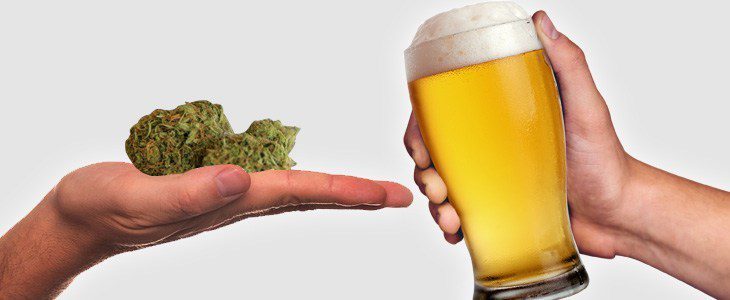Cannabis vs. Liquor Businesses in the Wake of COVID-19
Social distancing has likely saved countless lives, but that doesn’t mean that it’s been easy to implement. One glaring issue in the realm of social distancing orders is that much of the language is ambiguous. For example, citizens across the U.S. have been ordered to stay home to the “maximum extent possible” to help reduce the spread of COVID-19. Yet the definition of “maximum extent” may differ widely among individuals.

In the same vein, what makes up an essential service? While the definition of “essential” may also vary considerably at the individual level, state governments have more stringent mandates and guidelines in place. Interestingly, cannabis dispensaries and liquor stores are among those businesses deemed essential.
Under the threat of coronavirus, however, essential businesses have a large burden to bear. While shop employees are able to hold onto their jobs, they also put their personal health at risk to do so. Even curbside pickup services aren’t flawless when it comes to social distancing.
“The virus is still in the early stages of spreading,” according to USC’s Keck School of Medicine, and no vaccine is yet available. Thus, dispensary and liquor store workers may be risking their health every minute they’re on the clock. And that’s only the beginning of the story when it comes to the ways in which COVID-19 is impacting businesses that sell two of America’s favorite mind-altering substances: cannabis and liquor.
Are Alcohol and Cannabis Really “Essential”?
It’s important to note that cannabis is much more than a recreational drug. In 33 states and the District of Columbia, cannabis is considered a medical treatment for a number of health conditions, including epilepsy, glaucoma, and HIV. It makes sense, then, that marijuana dispensaries have been deemed “essential” in more than a dozen states.
Liquor has fared even better. Pennsylvania is among a handful of states that ordered liquor stores to close for a time, but in most U.S. states, alcohol has always been considered “essential.” Interestingly, that designation likely has roots in public health.
Unlike cannabis, alcohol is a physically addictive substance, and withdrawing without medical intervention can be deadly. Alcohol addiction is so severe that it may even be covered under the Americans with Disabilities Act (ADA). With a pandemic at center stage, addressing the root causes of alcohol addiction and searching for solutions become back burner issues in the realm of public health. Thus liquor stores logically remain open for business, as long as they continue to practice social distancing.
Merging Profits with Public Safety
Under the designation of essential and with millions of Americans stuck at home, alcohol is more popular than ever. Data from Nielsen indicates that off-premise liquor purchases were up 26% percent from the previous year for the week ending March 14. What’s more, customers are buying in larger quantities.
Yet some independent alcohol retailers have seen a significant drop in sales, stemming from a lack of events like weddings and parties, and fewer high-end liquor purchases. The good news is that some of those business owners may qualify for Coronavirus Aid, Relief and Economic Security (CARES) Act funds, which provides loans to small businesses. Franchisees and independent owners alike are welcome to apply.
Along with seeking out stimulus funds, there may be other ways for cannabis- and alcohol-based business owners to manage steady cash flow, even as COVID-19 continues to spread. For essential businesses such as liquor stores and dispensaries, a complete business model overhaul may be in order. To fully comply with stay-at-home orders and social distancing mandates, businesses must change the way in which they serve customers.
Adapting to an Altered Retail Landscape
Social distancing markers and notices have become the norm for the nation’s dispensaries, as has curbside pickup. But while cannabis users can order ahead online in many locations, payment must still be done in person. As cannabis remains illegal at the federal level, the vast majority of banks won’t work with businesses that sell cannabis, pushing credit cards out of the picture.
Thus, cannabis shops typically only accept cash as a form of payment. And cash is notoriously filthy, as cashiers in every industry can attest. As mobile and contactless payment options continue to grow at liquor stores and other retail shops, cannabis retailers don’t have much choice in the matter. Hand sanitizer is a must for front-of-house workers at each of the country’s cannabis shops.
By altering one’s business model to account for social distancing mandates, a chain reaction can occur all the way down the supply chain. For marijuana-based businesses, a reduction in healthy farmworkers in cannabis fields could ultimately result in product shortages at dispensaries. Or, business owners may downsize their staff even as sales climb in order to better adhere to shelter-in-place orders. No matter the changes made in a business model, every part of the supply chain will be affected.
Final Thoughts
Businesses across the country are feeling the economic burden of an altered business landscape in the shadow of COVID-19, and cannabis and liquor retailers are no exception. Unfortunately, the world is likely to see the repercussions of COVID-19 for years to come. Business owners should consider applying for federal stimulus money and implementing a semi-permanent change to their business model in order to better weather the economic storm in the wake of COVID-19.



